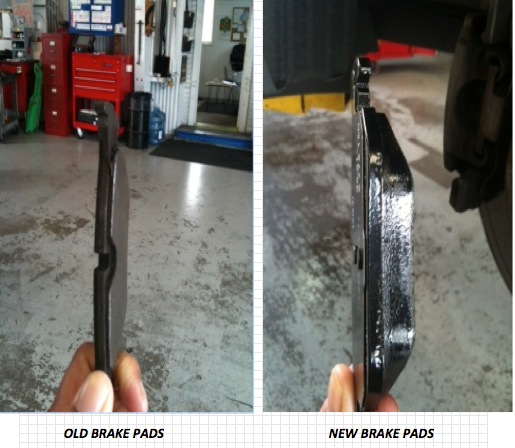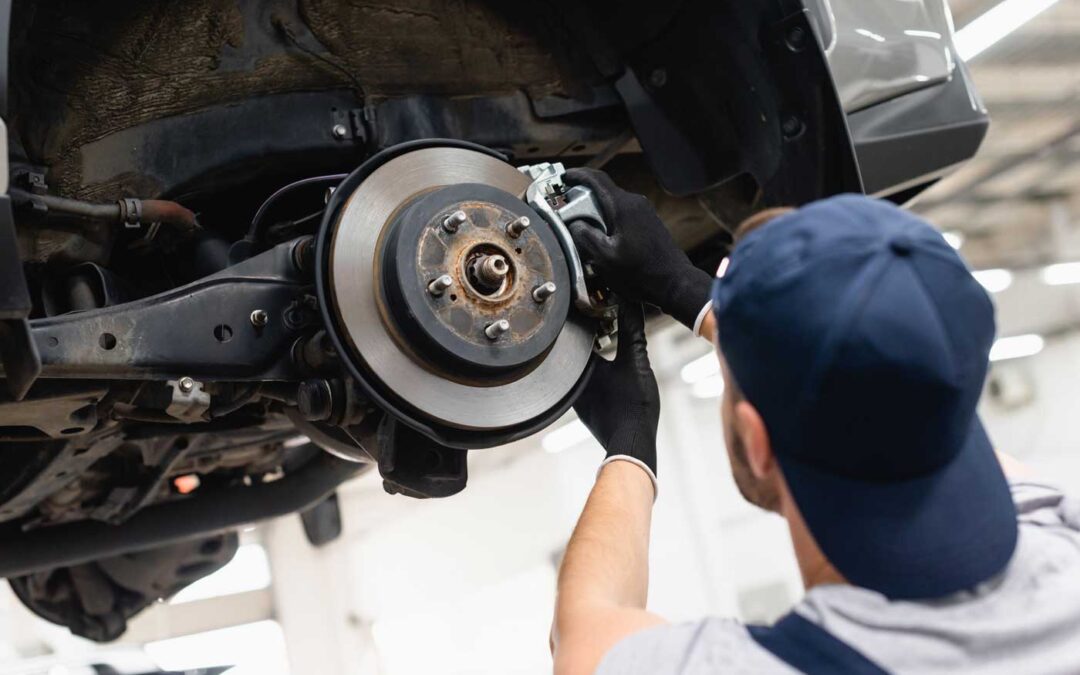Failing to take care of braking system can lead to expensive repairs or brakes that don’t work when you need them. It is much cheaper and safer to have your brakes inspected regularly and perform necessary maintenance before problems arise.
Signs That You May Have Problems With Your Brakes
All Around Auto Repair can inspect your brakes, but we encourage you to pay attention to warning signs as well. Here are some of the signs that you may need to bring your car to our auto repair shop to have your brakes looked at:
High pitched squeal or grinding sounds like fingernails on chalkboard. This means the shim has worn down to less than ¼ inch. That metal piece is touching the rotor of your vehicle.
Your vehicle is taking longer to stop. This is a sign that there may be something wrong with your stoppers so you should take your car to an auto repair station.
Your vehicle is starting to vibrate. This is often a sign that you have warped rotors. Vibrations can also indicate that your vehicle is out of alignment so you will need your mechanic to take a look. The vibration can feel like you are stopping your vehicle suddenly with anti-lock brakes.
Your brakes are not as responsive as they used to be or the pedal starts to sink toward the floor. This is often a sign that you have a leak in the braking system or brake hose. You should get your car into your mechanic immediately if you see a pool of brake fluid on the ground.
Your vehicle pulls to one side while braking. This could either mean that the brake linings are wearing unevenly or that there is foreign matter in the brake fluid.
Inspect Your Brakes at Our Auto Repair Center
Bring your car in for regular maintenance to avoid costly brake problems down the road. We can inspect your fluid levels, pads and rotors to identify any problems that may be developing. We typically advise customers to replace brake pads every 30,000 miles. However, you may need to buy new pads more frequently depending on driving conditions where you live. Rotors usually last much longer, but we can let you know when they need to be replaced.
For more information or questions on your brakes, please call All Around Auto Repair at (707) 837-0646. We are here to keep you safe on the road. Please don’t hesitate to call us if you need a brake repair.

FAQ Section for Braking System Maintenance
1. What are the warning signs that indicate my brakes need servicing?
If you hear high-pitched squealing or grinding when you brake, this could mean your brake pads are worn down. Another sign is if your vehicle takes longer to stop than usual, which suggests your brakes might be failing. Vibrations when braking often indicate warped rotors. Lastly, if your brake pedal sinks toward the floor or if your car pulls to one side while braking, you should get your brakes checked immediately.
2. Why is regular brake inspection important?
Regular brake inspection is crucial because neglecting your braking system can lead to expensive repairs or even brake failure when you need them most. It’s much more cost-effective and safer to have your brakes inspected regularly and perform necessary maintenance before problems arise. This proactive approach can save you from unexpected breakdowns and ensure your safety on the road.
3. How often should I replace my brake pads?
Generally, it’s advisable to replace your brake pads every 30,000 miles. However, this can vary depending on your driving conditions. For instance, if you frequently drive in heavy traffic or on hilly terrain, you might need to replace them more often. Regular inspections can help determine the optimal replacement schedule for your specific driving habits.
4. What does it mean if my vehicle pulls to one side when braking?
If your vehicle pulls to one side when you brake, it could mean that your brake linings are wearing unevenly or there’s foreign matter in the brake fluid. This issue should be addressed promptly to avoid further damage and ensure your vehicle’s braking system functions correctly.
5. What causes a brake pedal to sink toward the floor?
A sinking brake pedal usually indicates a leak in the braking system, either in the brake lines or the brake hose. If you notice this, it’s essential to get your car to a mechanic immediately. Ignoring this problem can lead to brake failure, which is a serious safety hazard.
6. Why does my vehicle vibrate when I apply the brakes?
Vibrations when braking are often a sign of warped rotors. This can also indicate that your vehicle is out of alignment. Either way, it’s a problem that needs attention from a mechanic. Driving with warped rotors can reduce braking efficiency and lead to more severe issues down the line.
7. How can I prevent brake problems?
Preventing brake problems involves regular maintenance, such as checking your brake fluid levels, pads, and rotors. Bringing your car in for regular inspections can help identify and address potential issues before they become major problems. This proactive approach helps ensure your brakes remain in good working condition and prolongs their lifespan.
8. What is the cost of brake repair?
The cost of brake repair can vary widely depending on the extent of the damage and the type of vehicle. On average, replacing brake pads can cost between $150 to $300 per axle, while rotor replacement can range from $200 to $400 per axle. Regular maintenance can help avoid these costly repairs by catching problems early.
9. How do I know if my brake rotors need to be replaced?
Signs that your brake rotors need replacement include a pulsating or vibrating brake pedal, a squealing noise when braking, or visible grooves or score marks on the rotor surface. Regular inspections by a qualified mechanic can help determine the condition of your rotors and whether they need to be replaced.
10. Can I drive with worn brake pads?
Driving with worn brake pads is not advisable. Worn pads can significantly reduce your braking efficiency and increase stopping distances, which can be dangerous, especially in emergencies. Additionally, continuing to drive with worn pads can damage your rotors, leading to more expensive repairs.


